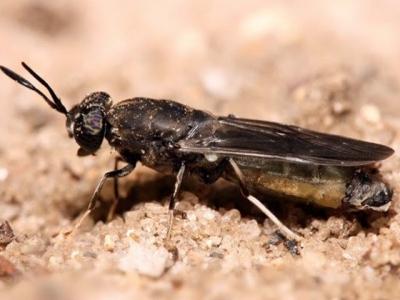Farmed insects can produce antimicrobial peptides

A recent study by Vogel et al. (2018) showed that BSFL can produce a broad spectrum of antimicrobial peptides in a substrate-specific manner.
Photo: Shutterstock
Black soldier fly (BSF) is an economically important farmed insect and its protein has been used in animal feed for a considerable time. Simultaneously, its frugality makes black soldier fly larvae (BSFL) also an important converter of organic wastes, such as manure. Rearing on organic wastes could, however, result in an infection of BSFL by potential pathogens, which is, naturally, a major concern for the animal feed sector.
Experimental set-up
In the study by Vogel et al, the researchers reared 10 g of BSFL on 10 g of different substrates for 72 hours. One substrate was a control substrate consisting of laying hen fodder and the second substrate was a test substrate consisting of 5 g laying hen fodder supplemented by 5 g of either sulfonated lignin, cellulose powder, chitin, brewer’s grains, or sunflower oil, and 3) a bacteria-enriched substrate consisting of 10 g laying hen fodder mixed with 1.25 g of either Bacillus subtilis, Micrococcus luteus, Escherichia coli BL21 (DE3), or Pseudomonas fluorescens BL915. Subsequently, RNA of BSFL was extracted and analysed for the expression of defence response-associated genes.
Effect on gene expression
Overall, 53 genes that were predicted to be antimicrobial peptides (AMPs) in BSFL were differentially expressed. These comprised of 6 putative attacins, 7 putative cecropins, 26 putative defensins, 10 putative diptericins, and 4 putative knottin-like peptides. These substances have been described to be active against Gram-positive and Gram-negative bacteria. Also, several peptidoglycan recognition proteins (PGRPs), and Gram-negative bacteria binding proteins (GNBPS) were identified. PGRPs and GNBPS are pattern recognition receptors (PRRs) that are involved in the detection of bacteria (Dziarski, 2004; Kim et al., 2000). In addition, several phenoloxidases were found to be differentially expressed. Phenoloxidases are important enzymes involved in defence response against bacteria, fungi, and viruses in insects (Gonzalez-Santoyo and Cordoba-Aguilar, 2012).
Type of substrate matters
Specifically, the investigation showed that rearing of BSFL on the protein-rich brewer’s grains containing substrate and the sunflower oil containing substrate resulted in the expression of the highest number and the highest levels of AMPs compared to the control substrate with laying hen fodder alone. The lowest number of significantly differentially expressed genes was found in BSFL reared on substrate with cellulose. This suggest that higher protein content and sunflower oil in the rearing substrate could induce stronger immune responses in BSFL. The researchers hypothesised that phytosterols such as sitosterol in sunflower oil could have immunomodulatory effects in BSFL.
When BSFL were reared on substrates with high bacterial loads, they produced several immune response-associated AMPs. This coincides with the previous suggestion of an induction of immune responses in BSFL by the presence of E. coli and M. luteus in their rearing substrate (Zdybicka-Barabas et al., 2017). It was, however, not investigated whether the high bacterial loads in the rearing substrate had detrimental effects on the health status or growth and development of the BSFL. This makes it hard to speculate on the significance of these findings.
Assays to estimate the growth inhibition of bacteria indicated that the composition of the rearing substrate affects the antimicrobial activities against B. subtilis, M. luteus, E. coli, and P. fluorescens. The effectiveness of growth inhibition was dependent on the specific bacterial species though. Nevertheless, the data points to increased antibacterial activity in BSFL when they are reared on protein-rich substrate. This could be associated to the substrate-dependent production of AMPs.
B. subtilis bacteria are Gram positive and generally non-pathogenic but some strains have been associated with the production of insect-specific toxins. M. luteus is Gram positive non-pathogenic bacterium that is commonly used in bacteriolysis assays (Kaaya, 1993). The Gram negative E. coli BL21 (DE3) is a non-pathogenic research model that is commonly used in life science labs and in the biotech industry (Jeong et al., 2009). P. fluorescens is a Gram negative bacterium that has been found to cause disease in immune-depressed human patients, and to cause sepsis after blood transfusion with contaminated blood products (Gershman et al., 2008; Morduchowicz et al., 1991).
Independence of antibiotics
The downside of the investigation was its relatively short rearing duration (72 hours) of BSFL on the respective substrates before RNA was extracted for gene expression analysis. Future investigations could aim to investigate the defence response associated with gene expression across the whole larvae stadium of BSFL.
References are available on request.
Có thể bạn quan tâm
 Vietnam’s farm produce uncompetitive because of packaging problems
Vietnam’s farm produce uncompetitive because of packaging problems To attract customers, manufacturers need to pay more attention to packaging, experts said.
 South African company to export fresh grape to Vietnam
South African company to export fresh grape to Vietnam South Africa’s In2Fruit company has signed a contract with Vietnam’s Fruit One counterpart to export fresh grape to Vietnam
 Vietnam wants to be top 15 organic farming countries
Vietnam wants to be top 15 organic farming countries The agriculture ministry seeks to turn Vietnam into one of world's top 15 organic farming countries by 2030, and has its sights on the EU market given trade dea
 Đồng Tháp farmers grow mango in off-season to stagger supply, sustain prices
Đồng Tháp farmers grow mango in off-season to stagger supply, sustain prices Đồng Tháp Province, the Cửu Long (Mekong) Delta’s largest mango producer, is staggering its production of the fruit to improve farmers’ incomes.
 South African company to export fresh grapes to Việt Nam
South African company to export fresh grapes to Việt Nam South Africa’s In2Fruit company has signed a contract with Việt Nam’s Fruit One counterpart to export fresh grapes to Việt Nam